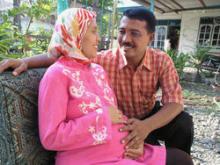
Pregnant woman with her husband
Pregnant woman with her husband
Research has demonstrated that more than 90% of women during the first year postpartum want to either delay or avoid future pregnancies. There is strong evidence of the health risks for mother and baby related to short birth intervals. The purpose of this course is to orient the learner to the rationale and the importance of family planning during the postpartum period, and to introduce the learner to service delivery, contraceptive methods, and programmatic considerations unique to family planning during the postpartum period.
Source: Ross and Winfrey 2001; WHO 2007
Objective
By the end of this course, you will be able to:
- Define stages of the postpartum period
- Define key terminology relevant to postpartum family planning
- Discuss the rationale for, and importance of, postpartum family planning
- Discuss contraceptive method considerations for the postpartum period
- Describe the elements of extended postpartum family planning that are different from family planning in general
- Discuss the role of integration in postpartum family planning programming
- Describe unique programmatic issues surrounding postpartum family planning
- Describe examples of postpartum family planning program integration
Credits
This course was originally authored by Barbara Deller, ACCESS-FP in November 2008 and has been updated by Elizabeth Sasser, MCSP and the FP team at MCSP.
The course authors would like to thank the following people for their review and inputs into the course content:
- Holly Banchard, ACNM/ACCESS-FP
- Patricia Gomez, Jhpiego/ACCESS
- Joseph Johnson, Save the Children/ACCESS
- Robin Anthony Kouyate, ACCESS-FP
- Patricia MacDonald, USAID
- Catherine McKaig, Jhpiego/ACCESS-FP
- James Shelton, USAID
- John Stanback, FHI
- Patricia Stephenson, USAID
Time
- 2 hours
Published/Updated
- Friday, October 7, 2016
Course Authors:
Elizabeth Sasser, MCSP
Barbara Deller, ACCESS-FP
Course Managers:
- Lisa Mwaikambo, CCP
Related Courses
- Family Planning 101
- Healthy Timing and Spacing of Pregnancy (HTSP)
- Gender and Sexual and Reproductive Health 101
- Family Planning and HIV Service Integration
